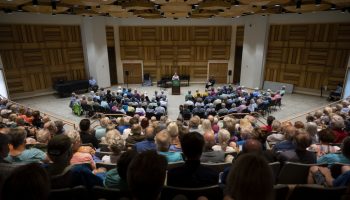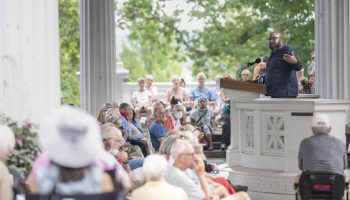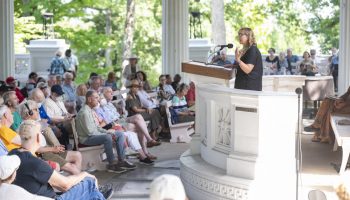
The ego structure that one develops in the first half of their life is a container; many can never let go of that container because they put so much time and effort into building it, said Fr. Richard Rohr, OFM. However, letting go of that container is key to transitioning from the first half to the second half of life.
“One cannot live the afternoon of life according to the program of life’s morning, for what was great in the morning will be of little importance in the evening,” Rohr said, quoting Carl Jung. “And, what in the morning was true, will at evening have become actually a lie.”
Rohr, a Franciscan priest of the New Mexico Province and founder of the Center for Action and Contemplation in Albuquerque, New Mexico, continued his lecture series in the Hall of Philosophy as part of Week Four’s interfaith theme, “Falling Upward: A Week with Richard Rohr.” The third lecture, presented on Wednesday, was titled “The Resistance.”
He began the lecture by recapping what he had discussed on Monday — the development of an ego structure. Then, he explained that this structure, also termed a “private salvation project” by Thomas Merton, is supposed to be taken away by God in order for one to receive the “real thing.”
“Anyone who wants to save his life must lose it,” Rohr said. “Anyone who loses her life, what she thinks is her life, will find it.”
Another term of Merton’s that Rohr used was “necessary suffering.” According to Rohr and Merton, people deal with a lot of unnecessary suffering because they will not accept the legitimate suffering that comes from being a human being. This is where, Rohr said, resistance originates.
More specifically, Rohr said suffering happens when one is not in control, making it difficult for people to let go of what they cannot control. And, when people resist letting go, the ego structure, or “container,” cannot expand and brings 10 times more suffering to people.
Rohr quoted the Gospel of John, saying, “Unless the single grain of wheat dies, loses its shell, loses its cover, it will remain just a single grain. But if it dies, let go. It will bear much fruit.”
Death, Rohr said, is where people struggle most to let go.
“What makes people neurotic is the result of refusing legitimate suffering,” Rohr said. “I can’t prove it or disprove it, nor do I need to, but … I’ve certainly seen it in myself. Neurotic behavior is the result of refusing that legitimate dying.”
Rohr said in that order to let go and accept such necessary suffering, one must have a well-developed ego structure. Between his disciplinarian mother and his kind father, Rohr said he was given a good balance to develop a good character. While his father was kind and soft, his mother would spank him and his siblings when necessary. And, she would say to them when she had to spank them, it was hurting her more than it was hurting them.
“You can waste an awful lot of years (thinking), ‘I didn’t deserve, I didn’t deserve,’ ” Rohr said. “Well, who of us deserves anything?”
Such experiences — ones people think they don’t deserve — remind Rohr of Jesus and how Jesus never played the victim or victimized anyone else. But even imperfect humans can learn to be more like Jesus and “let go.”
“Just learn from your wounds,” Rohr said. “That’s why the resurrected Jesus is shown holding his wounds after the Resurrection. That’s no small symbol. … Julian of Norwich says, ‘Your wounds are your glory. Your wounds are your honor.’ ”
Rohr said by not transforming the pain of legitimate suffering, one transmits it. Rohr learned this through the church and, although he never suffered from any tragic event himself, he experienced his own suffering through doubting himself and his preaching, and developing a form of self-hatred.
“That creates a different kind of darkness … that you wonder if it will ever end,” Rohr said. “Before the truth sets you free, it tends to make you miserable.”
Rohr developed what he called initiation rights — five universally communicated truths — in the ’90s. He said these were what people struggle to accept and follow. One of them is “everyone is going to die.” God has been alive forever, and has seen billions die, so there is no need to have a large ego when the truth is, everyone will die someday, Rohr said.
Another message is “no one is truly in control.” But Rohr said the most important message is “the way up is the way down.”
“The last will be first and the first will be last,” Rohr said. “If you seek too much to climb, to achieve, to perform, to succeed, you don’t know what most of the world has to suffer or feel like. In other words, you have no access to compassion. You have no access to love.”
Rohr said he had once lived behind a Catholic church, and that was where the Alcoholics Anonymous, Overeaters Anonymous and Narcotics Anonymous would smoke before or after meetings. So, he began to get to know them, and they invited him to their meetings. At these meetings, Rohr said he had never seen people more open about their shame.
“I’d be willing to bet most of us in this room have areas of shame that we can’t talk about,” Rohr said. “It’s just, it’s too hidden. It’s too painful. It’s too dark. It’s a territory that we haven’t walked in yet. We don’t have the words for it. It isn’t really bad will or malice. We have to be led there usually by someone else telling their story, and we see their courage and learn their vocabulary, and we do the same.”
Annie Dillard once wrote: “In the deeps are the violence and terror of which psychology has warned us that, if you ride these monsters down, the young would call it wrestling with your shadow.”
The shadow is not bad, Rohr said. The shadows are those depths, the shame that one tries to avoid. And, in order to address it, one needs “truth speakers” who will not guilt or shame them for trying to confront the actions that have caused such internal damage.
Accepting the natural occurrences in the cycle of life make for an easier death, Rohr said, but that acceptance — though necessary — is difficult.
“Nothing lives unless something else dies,” Rohr said. “And the whole natural world seems to surrender to this cycle except one species — you and me. And, I think to receive the God of grace with freedom, is to find your way through the resistance.”





